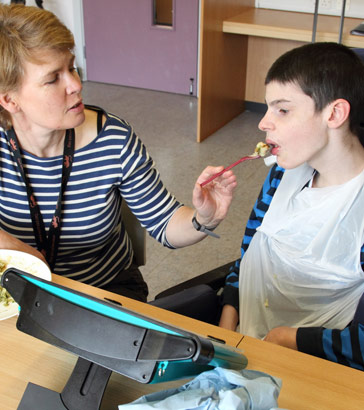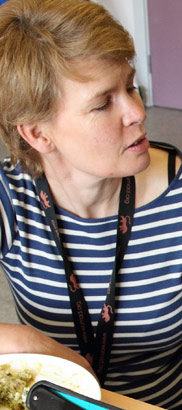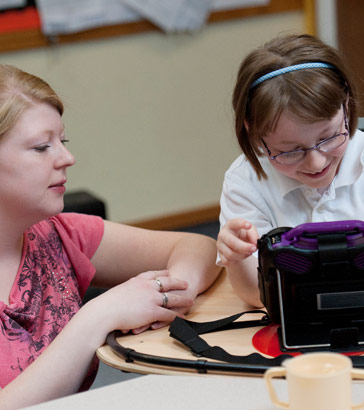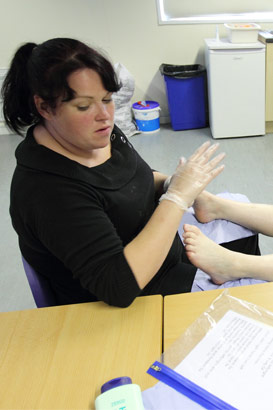
Those who offer [personal care] support will need access to good quality
and appropriate training, especially around particular skills. For example,
on particular feeding needs and communication approaches. Good support is
person-centred, flexible and creative to enable the person with profound
and multiple learning disabilities to learn and to achieve their full potential.
Mencap, 2010

The Children's Workforce Development Council (CWDC, 2010) identified six areas for the 'The common core of skills and knowledge for the children and young people's workforce'. These are relevant to providing personal and intimate care:
- Effective communication and engagement with children, young people and families.
- Development of children and young people.
- Safeguarding and promoting the welfare of children and young people.
- Supporting transitions.
- Multi-agency and integrated working.
- Information sharing.

Read the CWDC (2010) factsheet:
In what ways do you think each of the core skills would apply to safeguarding, privacy and dignity?
All training should place the child at the centre and promote the importance of understanding the child's daily life experiences, ascertaining their wishes and feelings, listening to the child and never losing sight of his or her needs.
All training should create an ethos that values working collaboratively with others (valuing different roles, knowledge and skills), respects diversity (including culture, race, religion and disability), promotes equality and encourages the participation of children and families in the safeguarding processes.
Those disabled children with communication impairments should have available to them at all times a means of being heard.
HM Government, 2010
Staff need theoretical training, secure knowledge and practical mentoring both generally and relating to individual children and young people with SLD/PMLD/CLDD. Focus areas may include:
- Ethos, ethics and practice expectations.
- Relevant policies and procedures.
- Protocols and risk assessments.
- Care plans and planning.
- Personalised routines and consistency.
- Recording and reporting.
- Involvement of others in delivering personal care to a child or young person with SLD/PMLD/CLDD (professionals and families) - rationale and practice.

HM Government (2010) advises that practitioners involved in personal care with children with disabilities should receive the following training to support safeguarding:
- Working with children of the opposite sex.
- Handling challenging behaviour.
- Consent to treatment.
- Anti-bullying strategies.
- Sexuality and sexual behaviour among young people, especially those living away from home.
- The Mental Capacity Act 2005 relating to young people post-16.

There are also mandatory training requirements in areas which impact on
personal care for children with SLD/PMLD/CLDD.
Read this document on training to support personal care for children and
young people with SLD/PMLD/CLDD.
Safeguarding training will give essential knowledge of:
- Forms of abuse.
- In what situations a child or young person is at risk of abuse.
- Safeguards to minimise the risk of abuse.
- How staff can avoid putting themselves at risk.
- The possible signs, indicators and effects of abuse (this is more complex in children with SLD/PMLD/CLDD).
- How to respond to concern or disclosure of abuse.
- Individuals' responsibilities in relation to suspected or disclosed abuse.
- How to follow the right systems, processes and procedures in your organisation and generally.
- What the UK law says about safeguarding children.
Key practitioner responsibilities in safeguarding include:
- Responding appropriately to concerns, indicators or disclosures of child abuse.
- Following their organisation's safeguarding children procedures and protocols.
- Knowing who to contact about safeguarding concerns or if abuse is suspected or disclosed.
- Putting safeguards in place to minimise the risk of abuse.
- Keeping training updated.

Children's Workforce Development Council (CWDC) (2010) The common core of skills and knowledge for the children and young people's workforce (factsheet).
HM Government (2010) Working Together to Safeguard Children: A guide to inter-agency working to safeguard and promote the welfare of children [currently under revision]. Annesley: DCSF Publications.

Mencap (2010) Understanding profound and multiple learning disabilities (Appendix 1 of Written evidence submitted by Mencap in: Education Committee (2011) Education: Third report. London: House of Commons. accessed: 6.1.12